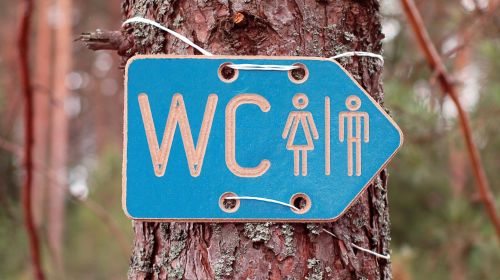Mostly it is women who get bladder infections again and again. But sometimes men also suffer from a urinary tract infection with painful urination and blood in the urine. Why cystitis is often more dangerous in men than in women and what helps affected men.
- Prolonged sitting on a cold surface can also cause a bladder infection in men.
- © iStock.com/AscentXmedia
Statistically speaking, cystitis is the exception in men: experts assume that every second woman gets a bladder infection at least once in her life, but only one in a hundred among men.
The reason for this lies in the female anatomy: women have a short urethra, the urethral opening is close to the anus. Bacteria can get into the bladder quickly and cause inflammation.
Article content at a glance:
Bladder infection: Bacteria are also the main trigger in men
The causes of cystitis in men, just like in women, are bacteria that occur naturally in the gastrointestinal tract. Above all, these are:
- Escherichia coli
- Enterococci
Men are better protected by nature: their urethra passes through the penis, so it is much longer. In addition, the distance between the urethral opening and the anus is large. Most bacteria are already made harmless within the urethra by the local immune system and do not even reach the organ.
The following external factors also play a role, which also apply to bladder infections in women:
- weakened immune system
- Cold (e.g. sitting on a cold surface)
- lack of hygiene in the genital area in general
- poor hygiene after sexual intercourse
Cystitis in men: the prostate is often to blame
What clearly differentiates the bladder infection in men from that in women: the cause of cystitis in men is usually an enlarged prostate (prostate gland). It hinders the urinary outflow from the bladder. The bladder cannot therefore empty completely (bladder emptying disorder). Residual urine remains in the bladder after each urination and provides a breeding ground for bacteria.
Benign prostate enlargement (benign prostatic hyperplasia) occurs when the male hormonal balance changes over the years and the production of sex hormones decreases. That is why the bladder infection mostly affects men who are older than 50 years. Young men rarely develop cystitis.
-

With just eight questions in the quick check, you can determine whether you may have a bladder infection. Test now!
for self-test
Cystitis: Men have similar symptoms to women
The signs of cystitis in men are:
Cystitis in men: when to go to the doctor?
While many women frequently and repeatedly suffer from uncomplicated urinary tract infections, which they can sometimes treat themselves, a bladder infection in men is mostly a case for the doctor. Because of the severe pain, those affected usually go to a doctor anyway.
There is also a risk that the inflammation will spread to the following other organs:
Such complications show up with blood in the urine, pronounced malaise and fever. In the worst case, there is a risk of blood poisoning (sepsis). Therefore, men should definitely see a doctor if they notice any of the symptoms listed, such as painful urination.
Treat cystitis in men
With a urine sample (urine culture) the family doctor or the urologist clarifies whether and which bacteria are in the bladder. However, it often takes several days to determine the result. But the description of the symptoms already suggests that it could be a bladder infection.
If the symptoms are very pronounced or are accompanied by fever and blood in the urine, the doctor will also examine the bladder, prostate and kidneys. He uses sonography (ultrasound) for diagnosis.
-

Treat urinary tract infections naturally and tolerably.
Herbal help – applicable at the first sign of cystitis.
Continue reading
He usually prescribes an antibiotic. For the treatment of uncomplicated cystitis men and women are recommended active substances from the substance groups:
- Aminopenicillins in combination with a beta-lactamase inhibitor
- Cephalosporins
- Fluoroquinolones
- Fosfomycin trometamol
- Nitrofurantoin
- Nitroxoline
- Pivmecillinam
- Trimethoprim or co-trimoxazole
The risk of developing multi-resistant germs is highest for fluoroquinolones and cephalosporins. Therefore, these two types of antibiotics should not be used as the first choice for uncomplicated cystitis.
In addition, warmth and drinking a lot make sense. Certain medicinal herbs such as hake, birch leaves and goldenrod have also proven their worth. The medicinal plants have a diuretic effect, residual urine is exchanged faster and bacteria can hardly grow due to the fresh wake.



